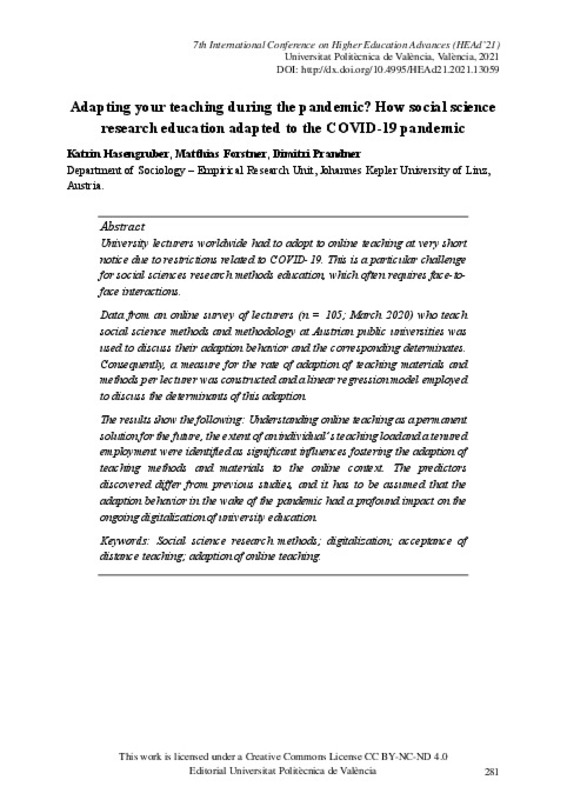JavaScript is disabled for your browser. Some features of this site may not work without it.
Buscar en RiuNet
Listar
Mi cuenta
Estadísticas
Ayuda RiuNet
Admin. UPV
Adapting your teaching during the pandemic? How social science research education adapted to the COVID-19 pandemic
Mostrar el registro sencillo del ítem
Ficheros en el ítem
| dc.contributor.author | Hasengruber, Katrin
|
es_ES |
| dc.contributor.author | Forstner, Matthias
|
es_ES |
| dc.contributor.author | Prandner, Dimitri
|
es_ES |
| dc.date.accessioned | 2021-09-14T10:51:28Z | |
| dc.date.available | 2021-09-14T10:51:28Z | |
| dc.date.issued | 2021-07-26 | |
| dc.identifier.isbn | 9788490489758 | |
| dc.identifier.issn | 2603-5871 | |
| dc.identifier.uri | http://hdl.handle.net/10251/172375 | |
| dc.description.abstract | [EN] University lecturers worldwide had to adopt to online teaching at very short notice due to restrictions related to COVID-19. This is a particular challenge for social sciences research methods education, which often requires face-to-face interactions. Data from an online survey of lecturers (n = 105; March 2020) who teach social science methods and methodology at Austrian public universities was used to discuss their adaption behavior and the corresponding determinates. Consequently, a measure for the rate of adaption of teaching materials and methods per lecturer was constructed and a linear regression model employed to discuss the determinants of this adaption. The results show the following: Understanding online teaching as a permanent solution for the future, the extent of an individual’s teaching load and a tenured employment were identified as significant influences fostering the adaption of teaching methods and materials to the online context. The predictors discovered differ from previous studies, and it has to be assumed that the adaption behavior in the wake of the pandemic had a profound impact on the ongoing digitalization of university education. | es_ES |
| dc.format.extent | 8 | es_ES |
| dc.language | Inglés | es_ES |
| dc.publisher | Editorial Universitat Politècnica de València | es_ES |
| dc.relation.ispartof | 7th International Conference on Higher Education Advances (HEAd'21) | |
| dc.rights | Reconocimiento - No comercial - Sin obra derivada (by-nc-nd) | es_ES |
| dc.subject | Higher Education | es_ES |
| dc.subject | Learning | es_ES |
| dc.subject | Educational systems | es_ES |
| dc.subject | Teaching | es_ES |
| dc.subject | Social science research methods | es_ES |
| dc.subject | Digitalization | es_ES |
| dc.subject | Acceptance of distance teaching | es_ES |
| dc.subject | Adaption of online teaching | es_ES |
| dc.title | Adapting your teaching during the pandemic? How social science research education adapted to the COVID-19 pandemic | es_ES |
| dc.type | Capítulo de libro | es_ES |
| dc.type | Comunicación en congreso | es_ES |
| dc.identifier.doi | 10.4995/HEAd21.2021.13059 | |
| dc.rights.accessRights | Abierto | es_ES |
| dc.description.bibliographicCitation | Hasengruber, K.; Forstner, M.; Prandner, D. (2021). Adapting your teaching during the pandemic? How social science research education adapted to the COVID-19 pandemic. En 7th International Conference on Higher Education Advances (HEAd'21). Editorial Universitat Politècnica de València. 281-288. https://doi.org/10.4995/HEAd21.2021.13059 | es_ES |
| dc.description.accrualMethod | OCS | es_ES |
| dc.relation.conferencename | Seventh International Conference on Higher Education Advances | es_ES |
| dc.relation.conferencedate | Junio 22-23, 2021 | es_ES |
| dc.relation.conferenceplace | València, Spain | es_ES |
| dc.relation.publisherversion | http://ocs.editorial.upv.es/index.php/HEAD/HEAd21/paper/view/13059 | es_ES |
| dc.description.upvformatpinicio | 281 | es_ES |
| dc.description.upvformatpfin | 288 | es_ES |
| dc.type.version | info:eu-repo/semantics/publishedVersion | es_ES |
| dc.relation.pasarela | OCS\13059 | es_ES |








